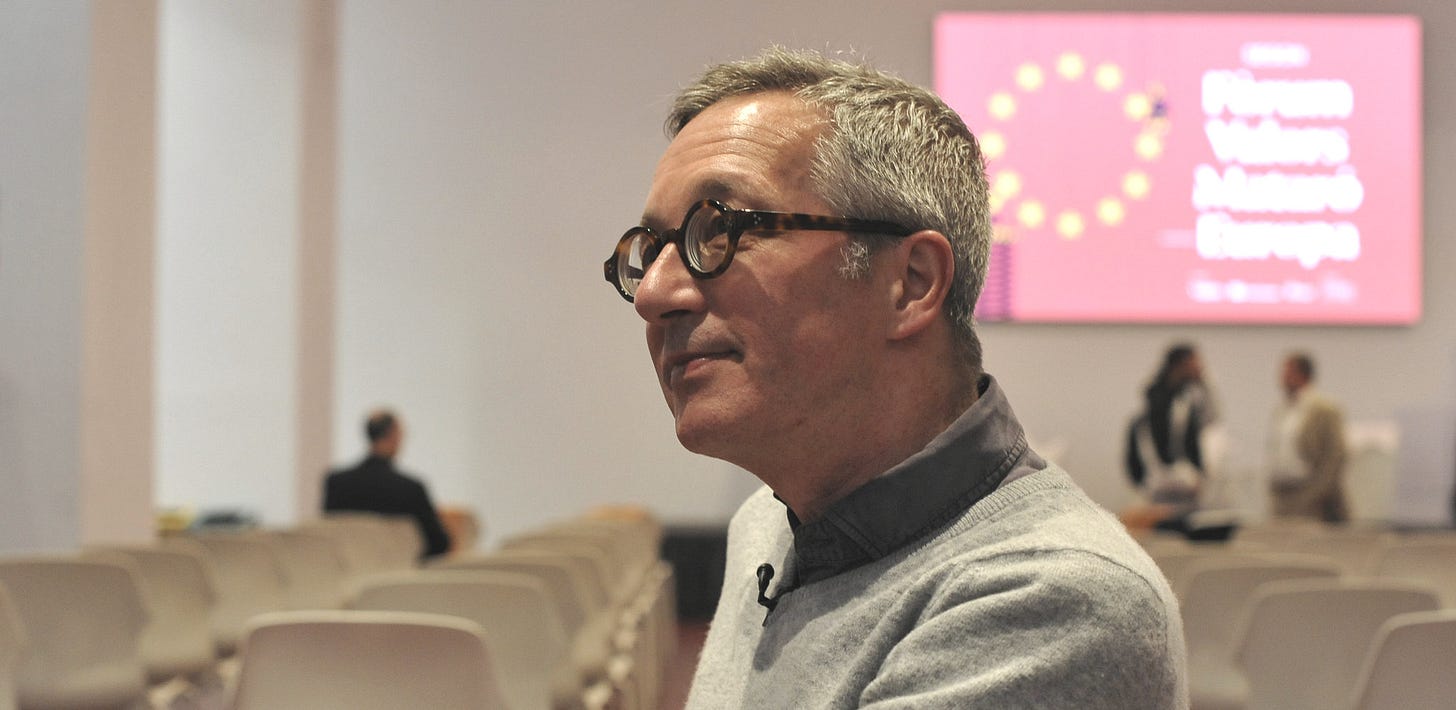🤖 “Is it possible for AI to reproduce human-like thinking?”
📰 Transparent Algorithm #83 – Interview with José María Lassalle 🔧 “Humanity’s opportunity is to relate positively to AI and even AGI, making it subordinate to human capability”
José María Lassalle Ruiz (Santander, 1966) is an essayist, university professor of Philosophy of Law, former Popular Party deputy in the Spanish Congress, and former Secretary of State for the Information Society, Digital Agenda, and Culture under Mariano Rajoy. He collaborates with various media outlets and his latest essays focus on artificial intelligence (AI). He is a consultant at Acento, the public affairs firm co-founded by former ministers Alfonso Alonso (PP) and José Blanco (PSOE).
AI is all around us—even in our soup. It is the defining topic of our time. Over the last five years, it has become a fundamental concept for understanding the contemporary world.
How long have you been studying it? I have been reflecting on, thinking about, and writing on AI since 2017, when I published my essay Against Populism, addressing the technological keys shaping what I called the "digital masses' rebellion" in populism. Technology, and particularly disruptive tools as powerful as AI, was exerting pressure on intellectual, cognitive, political, and social structures. As Secretary of State, one project I launched was turning Barcelona into a "digital Davos," reflecting on the social impact of disruptive technologies, among which, of course, AI was already present.
Was that the seed for the Barcelona Declaration? Yes. It was the embryo of what became the Digital Rights Charter. In Catalonia, it also led to founding the Digital Forum Society, one of the verticals of the Mobile World Congress Foundation.
How would you define what’s happened with AI over the past few years? We have moved past a techno-optimistic, somewhat naive view of technology's neutrality—broadly speaking—and placed it under critical scrutiny. While there is excessive techno-pessimism and even catastrophic thinking, we must find the balance allowing us to collectively take responsibility for AI's extraordinary potential for humanity. Without proper regulation and clear objectives, it can become a very dangerous tool.
Could Trump’s return to the White House, tariffs, and open conflict with China benefit the AI race? In my essay Artificial Civilization, I dedicated a chapter to the geopolitics of machines. One factor accelerating AI capabilities is the systemic competition between the U.S. and China to achieve a strong AI—precursor to AGI—first. I don’t know when that will happen, but both superpowers pursue AI leadership with a very utilitarian mindset, aimed solely at power. This scenario gives Europe an opportunity to propose different development parameters for AI that serve all humanity, rather than Chinese or American geopolitical interests.
🧠 “AIs handle information better. They may come to "know" better. But I don’t know if they’ll become wiser than us”
Might Trump push Europe out of its ethical comfort zone and to compete via models like France’s Mistral? The reaction was inevitable. Ursula von der Leyen announced in Paris the mobilization of €200 billion for a European AI initiative comparable to Airbus in aviation. That shows such projects aren’t improvised overnight. Mistral is a French design—almost a spin-off—that drives certain vectors we now need to integrate into a complex European system where each country contributes its strengths. Trump’s return is really a culmination of trends under Biden: the October 2023 Executive Order on AI makes the U.S. President the Commander in Chief on AI, subordinating private research to national security. Aligned with big tech’s push for AI monopolies—mirroring decades of U.S. tech policy—Europe must respond with its own AI strategy, not merely emulate the U.S. or China.
Could this be Europe’s chance to define its future, given recent political setbacks? Absolutely. With von der Leyen’s plan, we’ve branded ourselves the "AI continent." Europe must first define the purpose of AI: to enhance well-being as Europeans conceive it—cultural, tolerant, respectfully human-centered—different from American or Chinese conceptions. This vision should guide both risk avoidance and positive uses of AI as a human-centered assistant.
🌍 “Europe can build competitive AI. No jokes. The United States is an imperial republic”
🌐 Geopolitics and Market Leaders
Will one player—OpenAI or a Big Tech—"win the spoils," or could a nonprofit startup prevail? OpenAI currently leads, though its algorithmic "black box" details remain opaque. History suggests potential collusion or oligopolistic practices—parallel to late 19th-century U.S. industrial capitalism—could shape AI’s future. AI will dramatically boost corporate competitiveness, social control, and even weapons capabilities. We mustn’t underestimate that reality: the U.S., under Trump, openly pursues an "imperial republic" approach to AI.
What did you think when China’s DeepSeek emerged? It was truly disruptive: proof that the U.S. model isn’t the only path. AI need not rely on massive data training alone; selective, curated datasets can suffice, and chip reuse offers further efficiency. Europe has unparalleled assets—top-tier data, infrastructure (Barcelona Supercomputing, Max Planck), Nobel laureates, leading academic centers—that justify confidence in developing competitive AI.
🇪🇸 “Spain can play a significant role by investing in green algorithms and reducing CO₂ footprint”
🇪🇸 Spain’s Strategic Role
Is Spain’s AI ambition, as stated by Prime Minister Sánchez, credible? Spain can lead in "green algorithms": AI that reduces CO₂ footprints and promotes sustainable research. We’ve invested accordingly and built neutral data centers. With 99% national high-tech coverage—second in Europe only to Finland—and abundant talent, Spain’s challenge isn’t funding alone but defining a strategic national role, as we did with Airbus.
Do we know what role we want? Not yet. We need a strategic national vision. Spain—and the broader Latin linguistic sphere—offers unique semantic richness for generative AI. Romance languages carry nuanced concepts (e.g., "ser" vs. "estar") untranslatable in English, underscoring the geopolitical weight of Latin-based data.
There’s a paradox: Spanish speakers in Spain using American AI get Latin American Spanish responses. For the first time, Spain is on par with Catalonia: statehood doesn’t guarantee linguistic protection by AI. Correct. Spain need not build its own AI, but must ensure models recognize its citizens, even via shared international platforms. In a geostrategic AI context, traditional nation-state concepts no longer suffice.
🤝 Humanity and AI
Sam Altman’s roadmap predicts AGI by 2025. Are you afraid or respectful of AGI? I believe we could eventually achieve AI mimicking human multifactorial, multitasking thought, but authentic cognitive alterity—a truly "other" intelligence—will take many more years.
We already use reasoning AI models. As a philosopher, what do you think about AI "reasoning"? AI reasons based on logical operations over memory and data archives—humans’ own basic reasoning substrate. True qualitative leaps beyond efficient data retrieval—to radical AI alterity—will fail to replicate our uniquely human imagination, which springs from intuited alerts tied to our fragile, fallible condition. AI design strives to transcend limits; humans transcend via imagination and transcendence itself—an irreducible boundary. That is our opportunity: to embrace AI, even strong or general AI, as subordinate to human creativity and wisdom. AIs manage information superbly, but I doubt they’ll outwit human wisdom.
"They might not be wiser, but they’re already more creative in some respects..." Yes, but crafted from human legacy. Generative AI transcends mediocrity but normalizes around it. No matter how vast the training data, the most elite, refined, deeply human experiences—guilt, forgiveness, reconciliation, love, death—are rooted in lived experience, not code. That is our irreplaceable human domain.
Connecting real-time social media feeds like X can be "brutal"—Elon Musk is doing it. It harnesses humanity’s worst impulses: polarizing, reptilian violence—data that AI craves and uses, highlighting the urgency for ethical guardrails.
📚 “The impact of AI on the human psyche is enormous. We need a radically different education: to educate humans for AI”
📚 Education and Psyche
How will personal AI assistants affect humans day to day? We face a critical transition to permanent human-AI collaboration. Collaboration is essential, but AI’s impact on creativity, bodies, and time management is profound. We need a radically new education paradigm: preparing humans for AI. Without it, AI-driven inequality will become an insurmountable threat to democratic society.




